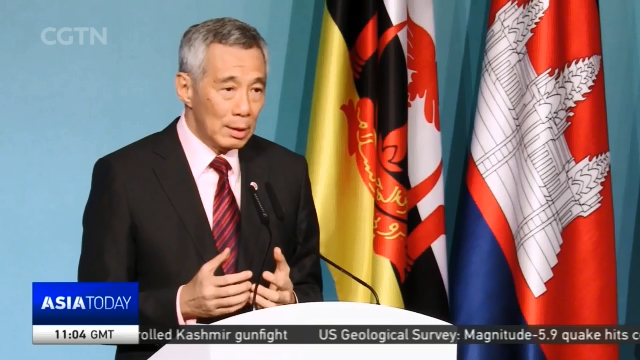
19:33, 09-Aug-2018
China-US Trade Frictions: Impact of trade conflict on Singapore so far
Updated
19:01, 12-Aug-2018
03:58

The trade conflict between the US and China has caused some worries in Singapore -- a trade-dependent and export-heavy economy. Our correspondent Miro Lu examines the impact the trade tensions are having on the country.
The escalation of the US-China trade tensions had caused some panic in the markets and worrying policymakers that a full blown trade war might hurt the global economy. This is particularly so for a small and open economy like Singapore.
Few months ago, Singapore's Prime Minister Lee Hsien Loong had even warned that a US-China trade war will have a big, negative impact on the city state.
However, some economists have observed that business sentiment in Singapore remains fairly positive and the impact of this trade conflict has so far been minimal.
IRVIN SEAH SENIOR ECONOMIST, DBS "If US consumers find more expensive to buy China-made goods, they can buy Japanese made goods, Korean made, Taiwan, from Thailand, from Singapore. Likewise, Chinese importers, if they find now it's too expensive to import soybeans from US, they can buy from elsewhere in the world. So trade war, yes, there could be losers, there could also be winners as well. So in other words, the impact could actually be less than what most people had expected."
Singapore Manufacturing Federation, which is one of Singapore's trade bodies, notes that though some industries in Singapore are feeling the heat, most local companies are able to tide through this period by having a broader market strategy. And meanwhile, the Federation is encouraging businesses to digitise and innovate as they face difficult challenges.
DOUGLAS FOO PRESIDENT, SINGAPORE MANUFACTURING FEDERATION "Some of those which are dealing with steel and appliances with their exports into the US market and some of their manufacturing plants that are housed in China itself, will be really impacted because of the direct tariffs exchange between the two large economies. Nevertheless, I think, a lot of our companies or enterprises they usually take a much wider approach rather than just working on a single market. So that's a consolation in itself."
Singapore has been pushing for more free trade agreements to diversify their options. Currently, it has 22 implemented free trade deals. But the city state might not be the only ones that see the benefits of free trade.
MICHAEL MICHALAK SENIOR VICE PRESIDENT, US-ASEAN BUSINESS COUNCIL "I would say that the business community in the US is definitely in favour of trade liberalisation. They're in favour of using all instruments of trade, bilateral and multilateral. I think it's fair to say that the majority of the business community believes that something like TPP is what we need to do now in order to get back to a rules-based trading system."
Though the impact on the trade friction on Singapore has not been obvious so far, the question remains that is: how long this conflict will last.
IRVIN SEAH SENIOR ECONOMIST, DBS "I think we are already seeing some signs of domestic sentiments within US against the trade war. I think the recent bailout plan on US farmers has been met with a lot of political resistance. With the mid-term elections coming up, I think Trump will have to play this card on trade war very very carefully."
MIRO LU SINGAPORE "No one knows for sure what will happen next, but Singapore is doing all it can to navigate the difficult terrain of global trade and to mitigate the effects of a full blown trade war. Miro Lu, CGTN, Singapore."

SITEMAP
Copyright © 2018 CGTN. Beijing ICP prepared NO.16065310-3
Copyright © 2018 CGTN. Beijing ICP prepared NO.16065310-3